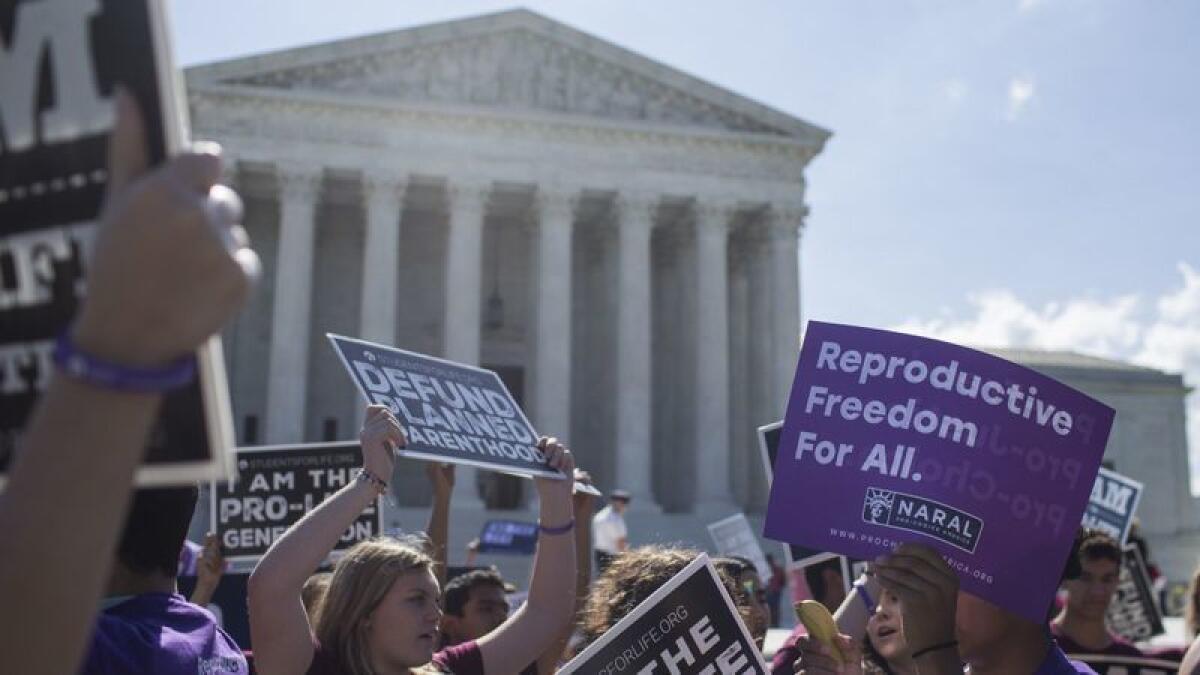Editorial: States needs to stop passing flagrantly unconstitutional antiabortion laws

Next month marks the 46th anniversary of Roe vs. Wade, the landmark Supreme Court decision guaranteeing a woman’s right to an abortion. That’s nearly half a century as settled law — and yet states continue to fight to undermine it, to restrict access and to return the country to the days of illegal abortions. As 2019 begins, these unnecessary battles will continue in courthouses and statehouses around the country.
Just since 2010, reproductive rights advocates estimate that a staggering 400 antiabortion bills have passed successfully through state legislatures. Some were so blatantly unconstitutional that federal judges banned them indefinitely or permanently. But that hasn’t stopped states from appealing the rulings or introducing other such bills.
The notorious Texas law requiring abortion providers to have admitting privileges at hospitals and mandating that abortion clinics be outfitted and equipped to the standards of ambulatory surgical centers — both of which are medically unnecessary requirements — was struck down by the U.S. Supreme Court in 2016 in another landmark ruling making it clear that the right to abortion means having access to abortion. Yet several states, including Louisiana and Missouri, have either passed or continued to enforce laws with very similar restrictions. In a few cases, federal courts allowed those laws to stand.
The fact that many of the laws don’t survive challenges in federal court doesn’t seem to deter lawmakers from coming up with new ones. Kentucky legislators are about to introduce a bill that will prohibit abortion after six weeks of pregnancy — a clear violation of Roe vs. Wade.
Several states have passed bills outlawing the most common method of second-trimester abortion, known as a dilation and evacuation procedure; those laws have generally been struck down in courts. Alabama, after losing all its appeals on its D&E ban, just petitioned the U.S. Supreme Court to hear the case.
An Indiana law that banned women from getting an abortion because of a disability detected in the fetus was enjoined by federal courts. The state of Indiana has asked the Supreme Court to take the case. A law in Ohio that bans a woman from getting an abortion just because the fetus will be born with Down syndrome was also enjoined by a federal judge and will be heard in an appellate court early next year.
It’s stunning that a state would try to interfere with a woman’s decision whether to take on the difficult and life-altering task of raising a child with a disability — or the related decision whether to subject a child to living with a severely disabling condition. Besides, as an ACLU attorney recently noted, allowing a state to pry into the reasons a woman decides to have an abortion strikes at the very heart of a woman’s right to make this private decision for herself. Given that, legal experts think it’s unlikely the Supreme Court will take the issue up.
Enter the Fray: First takes on the news of the minute from L.A. Times Opinion »
But who knows? There seems to be a push to get more antiabortion state laws on the books in order to prompt more federal lawsuits and increase the chances that the U.S. Supreme Court, with its new conservative majority, will seriously undermine — or overturn — Roe vs. Wade. In late November, U.S. District Court Judge Carlton Reeves said as much in a scathing rebuke of the state of Mississippi when he struck down its ban on abortions after 15 weeks.
Of more immediate concern than a broad Supreme Court ruling are the incremental state restrictions that manage to survive court challenges. Together, these are making it increasingly difficult for abortion clinics to stay open, intimidating doctors so that they won’t provide abortions and generally reducing access in so many places that the procedure becomes almost unobtainable, particularly for poor women without the means to travel. In several states, there is, literally, only one abortion clinic.
It’s unconscionable that states continue to obstruct access to abortion, and it’s particularly galling when they cloak their laws in fake concerns about the health and safety of women. Abortion rights advocates must continue to challenge these laws in court, the judiciary must defend its critically important 50-year-old precedent and, ultimately, opponents must accept that abortion is a constitutional right that is not likely to go away.
Follow the Opinion section on Twitter @latimesopinion or Facebook
More to Read
A cure for the common opinion
Get thought-provoking perspectives with our weekly newsletter.
You may occasionally receive promotional content from the Los Angeles Times.










